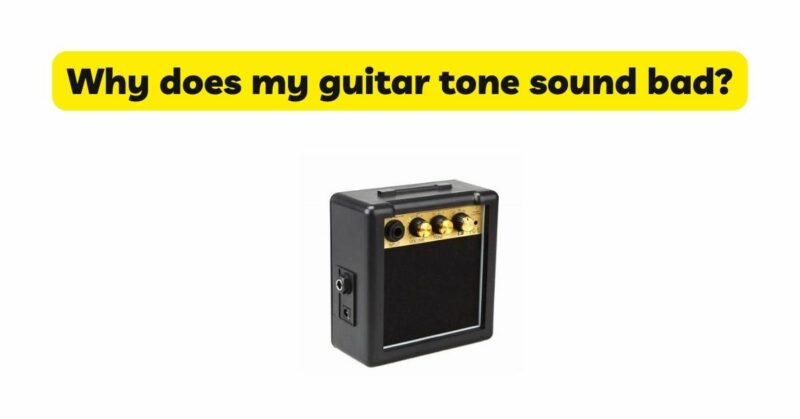The guitar tone is a fundamental element that shapes the overall sound and character of your instrument. However, there are instances where guitarists find their tone lacking, undesirable, or simply “bad.” Several factors can contribute to a subpar guitar tone, ranging from technical issues to playing techniques and equipment choices. In this article, we will explore common reasons why guitar tones may sound bad and provide practical solutions to help you improve and refine your tone. By understanding these factors and implementing the necessary adjustments, you can unlock the full potential of your guitar and achieve a more satisfying and enjoyable playing experience.
- Guitar Setup and Maintenance: a. Poor Action and Intonation: Incorrect action and intonation can cause notes to sound out of tune or produce unwanted buzzing, affecting the overall tonal quality. Regularly check and adjust the action and intonation to ensure accurate note production. b. Old or Worn-out Strings: Strings that are past their prime can produce a dull, lifeless tone. Regularly change your strings to maintain brightness, clarity, and sustain. c. Fret Wear or Uneven Frets: Worn or uneven frets can cause intonation issues and affect string vibration, resulting in inconsistent tone and playability. Have a professional guitar technician address any fret-related problems.
- Technical Issues: a. Pickup Problems: Faulty or improperly adjusted pickups can impact the guitar’s output, frequency response, and overall tone. Check for loose connections or consult a technician to ensure proper pickup performance. b. Electronics and Wiring: Loose or faulty wiring can introduce noise, interference, or signal loss, negatively impacting the tone. Inspect the electronics and wiring for any issues and address them accordingly. c. Output Jack Issues: A loose or damaged output jack can cause intermittent connections, leading to crackling sounds or signal dropouts. Check the output jack and have it repaired or replaced if necessary.
- Amp and Effects Settings: a. Incorrect EQ and Tone Controls: Inadequate adjustment of the EQ and tone controls on your amplifier or effects pedals can result in an unbalanced frequency response, making the tone sound muddy, harsh, or lacking in clarity. Experiment with different settings to find the optimal tonal balance. b. Improper Gain Staging: Improper gain staging can cause excessive distortion or insufficient gain, affecting the clarity and overall balance of the tone. Adjust the gain settings to achieve the desired level of distortion and maintain clarity.
- Playing Technique: a. Poor Picking or Fretting Technique: Inaccurate picking or fretting technique can affect note clarity, sustain, and overall tone. Focus on developing proper picking and fretting techniques to improve articulation and control over the instrument. b. Inconsistent Dynamics: Lack of control over dynamics, such as playing too softly or with excessive force, can result in an inconsistent tone. Practice and develop your dynamic control to achieve a more expressive and consistent tone.
- Room Acoustics: a. Unfavorable Room Reflections: Room acoustics can significantly impact the guitar tone. Excessive reflections can cause a boomy or washed-out sound. Consider adding acoustic treatment, such as diffusers or absorbers, to minimize unwanted reflections and improve clarity. b. Standing Waves: Standing waves caused by room dimensions can result in frequency build-ups or cancellations, leading to uneven frequency response. Adjusting the position of your guitar or changing your playing location within the room can help mitigate the impact of standing waves.
- Equipment Choices: a. Poor-quality or Mismatched Pickups: Pickups play a crucial role in shaping the guitar’s tone. Low-quality or mismatched pickups may not provide the desired sonic characteristics, resulting in a subpar tone. Consider upgrading to high-quality pickups that match your preferred style and tone. b. Inadequate Amp or Effects Pedals: Using an amp or effects pedals that do not complement your playing style or desired tone can negatively impact the overall sound. Research and invest in equipment that aligns with your musical goals and preferences.
Conclusion: A bad guitar tone can be discouraging, but by addressing common issues and making appropriate adjustments, you can significantly improve the sound quality and enjoy a more satisfying playing experience. Consider factors such as guitar setup and maintenance, technical issues, amp and effects settings, playing technique, room acoustics, and equipment choices when troubleshooting and refining your guitar tone. Regular maintenance, experimentation with settings, seeking professional assistance when needed, and embracing personal preferences are key steps towards unlocking the true potential of your guitar’s tone. With dedication and attention to detail, you can transform a lackluster tone into a captivating and inspiring sound that enhances your musical expression.


